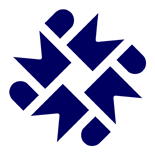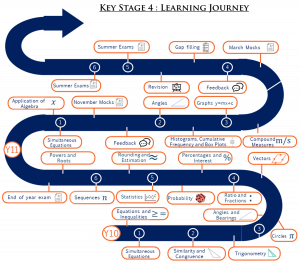Key Stage 4: Mathematics
Curriculum Intent:
Mathematics is a creative and highly inter-connected discipline that has been developed over centuries, providing the solution to some of history’s most intriguing problems. It is essential to everyday life, critical to science, technology and engineering, and necessary for financial literacy and most forms of employment.
At Murray Park School we have planned our curriculum to ensure that our students are provided with a foundation for understanding the world, the ability to reason mathematically, an appreciation of the importance of mathematics, alongside instilling a sense of enjoyment and curiosity about the subject.
The beauty of Mathematics is that it has many links in which students need to be able to move fluently between representations of mathematical ideas, therefore, we have ensured that we have programmes of study for key stage 4 that are organised into the core fundamentals of Maths, but also allow students to build upon the knowledge gained in prior stages. The students make connections across mathematical ideas to develop fluency, mathematical reasoning and confidence in solving more complex problems.
By following the national curriculum for mathematics we ensure that our students will be able to:
- become fluent in the fundamentals of mathematics, including through varied and frequent practice with increasingly complex problems over time, so that students develop conceptual understanding and the ability to recall and apply knowledge rapidly and accurately.
- reason mathematically by following a line of enquiry, forming relationships and generalisations and developing an argument, justification or proof using mathematical language
- solve problems by applying their mathematics to a variety of routine and non-routine problems with increasing sophistication, including breaking down problems into a series of simpler steps and persevering in seeking solutions.
We know and appreciate that Mathematics can be hard, but we want our students to grapple and flourish with the exciting opportunities we have to offer in the depths of exploring different contexts.
We are continually raising the standards of achievement of the students at Murray Park School, ensuring all students are challenged to meet their full potential.
Curriculum Overview:
All students in KS4 follow the National Curriculum. The yearly teaching programmes for Years 10 and 11 are set out by the National framework and are organised in five main Mathematics strands. The areas covered are:
Number
Ratio and Proportion
Algebra
Geometry and Measures
Probability and Statistics
Numeracy
Numeracy is not mentioned in the above strands as this is crucial through all of the Mathematics taught. Numeracy is the ability to be able to use Mathematics in the real world and apply it to make the best possible decisions. Our curriculum has been designed in order to allow students to have the opportunity to explore and link to real life contexts of Mathematics, through the application of percentages to look at calculating interest rates on bank accounts and working out prices in sales, to calculating the amount of ingredients needed in a recipe when cooking for more or less people and calculating costs for redecorating rooms to name a few. Numeracy skills are equally as important as literacy skills and are fundamental to everyday life.
Key Stage 4 Curriculum
We have ensured that our Key Stage 4 curriculum allows students to further their progress by using the fundamentals gained in Key Stage 3 to underpin the new content learnt, checking that the foundations of each skill are secure, enables the students to recall and to retrieve prior knowledge. Our students all have the same opportunities to access the content delivered within the curriculum and are stretched in every single area. To support the delivery of our curriculum, we set frequent assessments and use pre and post testing to ensure that our students are accessing a programme that is tailored to their individual needs.
The assessment of the course is measured by an examination at the end of Year 11. This is broken down into three separate Mathematics papers; one non-calculator and two calculator papers, each lasting our hour and thirty minutes. Due to the nature of Mathematics and the constant linking of content, these are not broken down into topics given for each paper, however, the assessment objectives for the three papers combined have the following weightings of skills:
Students in Year 10 have a carefully sequenced curriculum to support retention and interleaving in order for them to develop their mathematical skills in line with the National Curriculum to prepare them for their GCSE examinations. In year 10 we have broken up key areas of mathematics which each have a half termly focus, this starts with extending number skills from KS3, revisiting standard form and indices, extending knowledge to look at surds and using and applying knowledge of fractions and percentages. This leads to the next half term focusing on Geometry – 2D shapes and the properties and application of triangles before finishing on transformations. The spring terms starts with looking into reasoning and proportion with algebra before looking at 3D shapes and surface area and volume. The summer term shifts to look at probability and statistics before finishing the year on working with algebra using simultaneous equations and solving and the first set of Mock Exams.
Students in year 11 follow a scheme of work which is balanced between revision and retrieval and key topics all students will cover together. As there are two mock sessions throughout the year, the week before and during these mock periods is focussed specifically on supporting students’ needs and confidence for upcoming exams and will be directed by the teacher. The remainder of the year 11 curriculum identifies the final key topics needed for students to complete the national curriculum along with extra time and support used as interventions from assessments. The Autumn term starts by extension of algebra skills, focussing on algebraic fractions, changing the subject of a formula, identities and functions. This leads to Mock 2 Exams , followed by extending on knowledge of angles and properties of polygons. The spring term begins by a review of statistics and their representations. Before working on the properties of y=mx+c and graphs, followed by the Mock 3 Exams. Following these exams, the focus shifts to tailoring the revision for each of the classes, allowing time and opportunity to intervene on areas of weakness and confidence build in preparation for the External Examinations.
GCSE Statistics
GCSE Statistics gives students the opportunity to broaden their knowledge in a key component of Maths that is relevant to everyday life. They will develop a core statistical grounding, as well as transferable skills and understanding that is applicable to a range of other subjects. It will also give a deeper understanding of the statistical content in mathematics. It complements subjects such as GCSE Biology, Geography, Business and opens the door to a variety of careers – from weather forecasting to the biological sciences. Statistics is an optional subject which can be chosen to study in Years 10 and 11.
GCSE Further Maths
Chosen students have been offered the opportunity to study AQA Level 2 in Further Mathematics to supplement their course at Murray Park.
Further Mathematics is an extra GCSE qualification for your child that would fit around the course content studied in Maths, whilst giving an insight into the content that would be studied at A-level. The course delves deeper and provides a richer understanding for the topics studied at GCSE Maths. The exam will be taken in Year 11 alongside your child’s other GCSE exams.
Extra-curricular activities
The Department provides Booster sessions to help the students to focus on their areas for improvement. Commit2six sessions are also provided for the students in key stage 4 to help them to prepare for their GCSE examinations.
Useful Websites
Alongside the teaching in the classroom, students will be directed to use the following websites for homework purposes or for revision materials:
TTRockstars – www.ttrockstars.com
Sparx maths – https://www.sparxmaths.uk/



